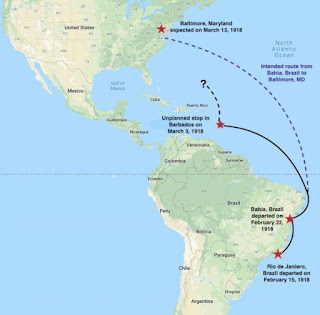A Mad Captain, Dangerous Cargo and a Baffling Mystery: The Unexplained Disappearance of the USS Cyclops
On February 16, 1918 the naval collier USS Cyclops set sail from Rio de Janeiro in Brazil and headed north on her way to port in Baltimore, Maryland.
She was carrying approximately 11,000 tons of manganese ore. Manganese, designated Mn on the periodic table of elements, is a metallic chemical element. It is an important element in the manufacture of stainless steel and a necessary part of munitions manufacture which was vital to the war effort of the United States and its allies during the First World War.
At the time, there were conflicting reports regarding the cargo capacity of the USS Cyclops. Some reports stated that the Cyclops could only safely transport approximately 8500 cubic tonnes of cargo, and that she was dangerously overloaded with 11,000 tonnes of manganese ore aboard upon leaving Rio on that fateful day of February 16, 1918. Though, it must be noted that previously, the Cyclops had been documented as having safely carried cargo loads in excess of 10,000 cubic tonnes of wartime supplies across the Atlantic many times during the previous year.
Nonetheless, overloaded or not, she set sail uneventfully on that day and began her trip north to supply the munitions factories of the northeast United States
Two days later she crossed the equator and on March 4, 1918 the Cyclops was sighted near her home port off the coast of the southeast United States by a giant tanker ship carrying molasses called the Amalco. The crewmen aboard the Amalco were the last people to ever set eyes on the USS Cyclops.

Route of the USS Cyclops
Sometime after March 4, 1918 the 550 foot long USS Cyclops, one of the largest ships then commissioned by the United States Navy, along with all 309 crewman and civilian employees aboard simply vanished without a trace never to be seen, or heard from, by anyone ever again. Not even a single piece of wreckage from the USS Cyclops has ever been found.
To this day, well over one-hundred years later, the seemingly inexplicable disappearance of the USS Cyclops still remains the single largest loss of life not involving combat in United States naval history.
Originally built in 1910 as a collier, or ship designed to carry and transport coal, for use by the United States Navy, the Cyclops was officially launched from a shipyard in Philadelphia on May 7th of that year and upon commission she was assigned to the Navy’s Atlantic Fleet.
In 1914-15 the Cyclops served off the coast of Mexico during the United States annexation and occupation of the Mexican port city of Veracruz. On May 1, 1917 upon American entry into World War One the Cyclops journeyed to the French port of St. Nazaire carrying vital supplies for the allied war effort.
 |
| U.S. Occupation of Veracruz 1914 |
In January of 1918 the USS Cyclops was assigned to the United States Overseas Naval Transportation Service, a branch of the US Navy that used the services of civilian contractors in addition to Naval crewmen to transport wartime supplies. Commander George W. Worley was named Captain and put in overall command of the Cyclops.
Captain George W. Worley was an interesting choice to command the USS Cyclops to say the least, and it may have been Worley himself, who more than anyone else sealed the tragic fate of the forlorn ship.
In late March of 1918, only weeks after the inexplicable disappearance of the Cyclops the United States Navy under the auspices of Secretary of the Navy Josephus Daniels launched an investigation into the disappearance of the Cyclops. It was one of the most extensive and exhaustive searches and investigations in the history of the United States armed forces up to that time.
Though at first it was assumed that the Cyclops had fallen victim to a German U-boat, or perhaps enemy sabotage off the east coast of the United States, as time went on and no trace whatsoever of the ship could be found the United States Office of Naval Intelligence began to more closely scrutinize the life of Captain George W. Worley in order to try and gain greater insight into the tragedy that had befallen the ship.
Secretary Daniels went on record writing that, “There has not been a trace of the vessel, and long continued and vigilant search of the region has been proven futile.”
On June 1, 1918 nearly three full months after the USS Cyclops seemingly vanished off the face of the earth, then Assistant Secretary of the Navy Franklin D. Roosevelt was forced to conclude the investigation by declaring that the Cyclops had been, “Officially lost at sea with all hands aboard.”
Given the lack of evidence Roosevelt was unable to further speculate on the nature, or cause, of the ship’s disappearance in the United States Navy’s official report on the matter.
However, though the Office of Naval Intelligence may not have been able to shed any new light on the Cyclops' whereabouts through their exhaustive investigation, what the Navy found out about Captain Worley was quite surprising and even somewhat bizarre.
 |
| Captain George W. Worley |
Captain George W. Worley was born Johan Frederick Wichmann in the state of Hanover, Germany sometime in 1862. This German connection between the Cyclops Captain and the ship’s mysterious disappearance once again sparked debate about possible sabotage both in the press and in the Naval Intelligence community, though no other connection between the Cyclops and possible German foul play other than Captain Worley’s German birth could ever be positively established or verified by anyone.
Sometime as a young man, Johan Frederick Wichmann had immigrated to the United States and settled in San Francisco. He became a saloon owner and changed his name to George Worley during the 1880’s, naming himself after an acquaintance he met at the bar he owned who was, in fact, a sailor.
After failing as a saloon keeper the German born Worley took to sea in the late 19th century aboard various merchant vessels departing from the west coast of the United States. Eventually, Worley rose in the ranks of the merchant service rising to the level of Ship’s Master and then finally Captain in command of cargo vessels departing from the port of San Francisco.
It was at this time that many of Worley’s colleagues, and crewmen who served under him began to speculate that their Captain might be involved in illegal opium smuggling to and from the far east and that due his outlandish behavior and brutal outbursts, perhaps also suffered from a personality disorder or borderline sociopathic behavior.
During their investigation into the disappearance of the Cyclops the Office of Naval Intelligence interviewed hundreds of former crewmen and acquaintances of Captain George Worley. Investigators learned through these interviews that Worley would often viciously berate those serving under him and was prone to violent outbursts while at sea.
One of Captain Worley’s most bizarre habits, it was discovered, was that while at sea he would make his daily rounds wearing nothing more than long underwear and a derby hat while carrying a loaded revolver. It was also learned that often Worley would have inexperienced crew members load cargo onto his ships while confining his more experienced crewmen to their quarters, quite possibly so that officers serving under him would not learn of his illegal opium smuggling side operations.
The investigation revealed that prior to departing Rio in February of 1918 Worley had assigned completely inexperienced crewmen to load the dangerous cargo of manganese ore onto the Cyclops perhaps in an effort to intentionally overload his vessel and receive a higher commission for transporting more of the valuable cargo.
Manganese ore is extremely dense, even more so than coal, and this density would have enabled the cargo to move around in the holds of the ship during its voyage, which in theory, would have made the ship more unstable and could have, in bad weather or rough seas, made the Cyclops more susceptible to capsizing or even sinking than otherwise would have been the case.
It is interesting to note that just prior to departing from Rio de Janeiro on its final voyage, Captain Worley did make note of a cracked cylinder in one of the Cyclops' engines, and this would have meant that the ship set sail both under-powered and possibly dangerously overloaded with unsecured cargo. Many experts have speculated that a series of events leading to flooding in the cargo hold of the Cyclops while at sea in the Atlantic would have led to the ship’s filling with water and than sinking abruptly, not giving any crew members sufficient time to flee the stricken vessel, though it should be noted that without any physical evidence to back this highly plausible theory up it remains nothing more than mere speculation.
 |
| Postmarked Letter sent from a Crewman aboard the Cyclops |
The last wireless message received from the Cyclops by the US Naval Station in Norfolk, Virginia stated only, “Weather Fair. All is Well.”
The next day after that wireless message was received the Cyclops was sighted in calm seas by the cargo ship Amalco, and then at some unknown time after that, she simply vanished off the face of the earth without even so much as an SOS signal or any attempt whatsoever at radio communication.
In an article published less than a decade after her disappearance in the Santa Fe Times of New Mexico it was noted that, “Usually a wooden bucket or cork life preserver as belonging to a lost ship is picked up but not so with the USS Cyclops…it is as if she just disappeared as if some gigantic monster of the sea had just grabbed her.”
Over the last century there have been many outlandish and sensational theories about the ship’s disappearance. Some attribute the vanishing of the Cyclops to UFO’s; some say she was transported to another dimension of time and space through an electro-magnetic field akin to a Bermuda Triangle of the north Atlantic, and some historians cling to the idea that she was intentionally sunk and destroyed by Worley himself who many claim was an ardent German sympathizer.
There were reports at the time that Worley was even incapable of steering the ship and that he was often drunk for days on end, though the United States Navy, at least officially, has exonerated Captain George Worley from all blame for the loss of the Cyclops.
The US Navy in its official report on the Cyclops stated that, “The disappearance of this ship has been one of the most baffling mysteries in the history of the Navy.”
Perhaps, one day the ocean will give up its secrets and the true fate and location of the USS Cyclops will be revealed. Until then the disappearance of this giant naval vessel remains to this day one of history’s most baffling mysteries.





Seen this in a book I have somewhere fascinating story, but Cyclops loss put down to The BermudaTriangle, but was it??
ReplyDelete